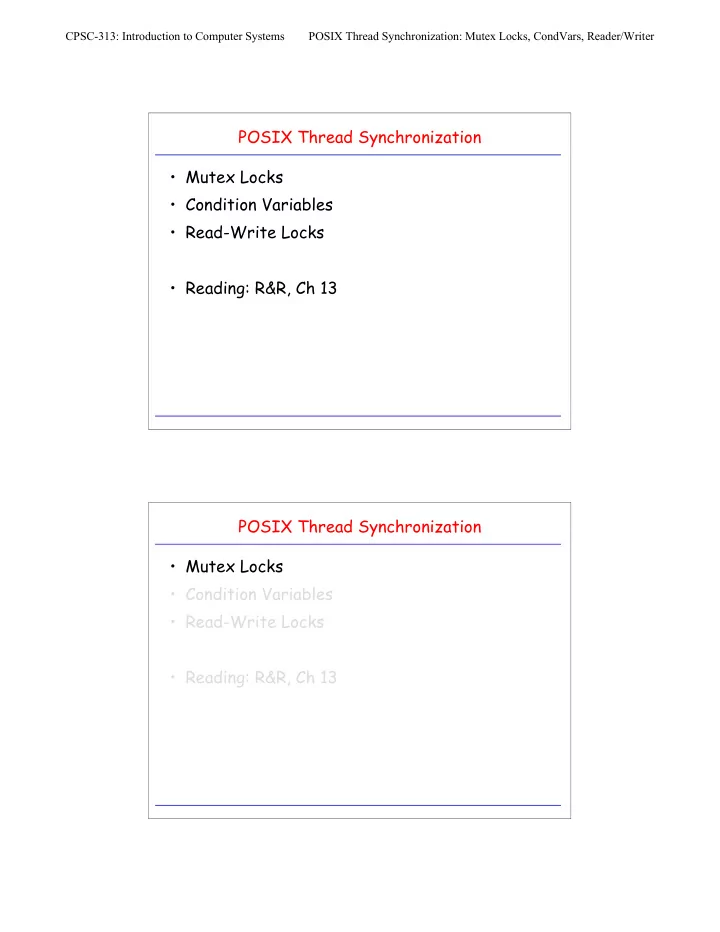

CPSC-313: Introduction to Computer Systems POSIX Thread Synchronization: Mutex Locks, CondVars, Reader/Writer POSIX Thread Synchronization • Mutex Locks • Condition Variables • Read-Write Locks • Reading: R&R, Ch 13 POSIX Thread Synchronization • Mutex Locks • Condition Variables • Read-Write Locks • Reading: R&R, Ch 13
CPSC-313: Introduction to Computer Systems POSIX Thread Synchronization: Mutex Locks, CondVars, Reader/Writer Mutex Locks #include <pthread.h> int pthread_mutex_init ( pthread_mutex_t * restrict mutex, const pthread_mutexattr_t * restrict attr); pthread_mutex_t mutex = PTHREAD_MUTEX_INITIALIZER; EAGAIN: System lacks non-memory resources to initialize *mutex ENOMEM: System lacks memory resources to initialize *mutex Caller does not have appropriate privileges EPERM: int pthread_mutex_destroy (pthread_mutex_t *mutex); int pthread_mutex_lock (pthread_mutex_t *mutex); int pthread_mutex_trylock (pthread_mutex_t *mutex); int pthread_mutex_unlock (pthread_mutex_t *mutex); EINVAL: mutex configured with priority-ceiling on, and caller’s priority is higher than mutex’s current priority ceiling. another thread holds the lock (returned to mutex_trylock ) EBUSY: Mutex Locks: Operations pthread_mutex_t mylock = PTHREAD_MUTEX_INITIALIZER; pthread_mutex_lock (&mylock); /* critical section */ pthread_mutex_unlock (&mylock); • Use mutex locks to preserve critical sections or obtain exclusive access to resources. • Hold mutexes for short periods of time only! • “Short periods”?! – For example, changes to shared data structures. • Use Condition Variables when waiting for events!
CPSC-313: Introduction to Computer Systems POSIX Thread Synchronization: Mutex Locks, CondVars, Reader/Writer Uses for Mutex Locks: Unsafe Library Functions Def: Thread-safe function: Exhibits no race conditions in multithreaded environment. • Many library functions are not thread-safe! • Can be made thread-safe with mutexes. #include <pthread.h> #include <stdlib.h> int randsafe(int * result) { static pthread_mutex_t lock = PTHREAD_MUTEX_INITIALIZER; int error; if (error = pthread_mutex_lock (&lock) return error; *result = rand(); return pthread_mutex_unlock (&lock); } Threads and Priorities: Interlude on Mars! • Landing on July 4, 1997 • “experiences software glitches” • Pathfinder experiences repeated RESETs after starting gathering of meteorological data. • RESETs generated by watchdog process. • Timing overruns caused by priority inversion. • Resources: http://research.microsoft.com/~mbj /Mars_Pathfinder/
CPSC-313: Introduction to Computer Systems POSIX Thread Synchronization: Mutex Locks, CondVars, Reader/Writer Priority Inversion on Mars Pathfinder Task bc_sched blocks on mutex detects overrun becomes active high priority Task bc_dist other tasks Task ASI/MET low priority starts gets preempted locks mutex POSIX Thread Synchronization • Mutex Locks • Condition Variables • Read-Write Locks • Reading: R&R, Ch 13
CPSC-313: Introduction to Computer Systems POSIX Thread Synchronization: Mutex Locks, CondVars, Reader/Writer POSIX Condition Variables waiting for a particular condition (e.g. x==y) while (x != y); correct strategy to wait for condition while (x != y): 1. lock a mutex 2. test the condition (x==y) 3. if TRUE, unlock mutex and exit loop 4. if FALSE, suspend thread and unlock mutex (?!!!) pthread_mutex_lock(&m); while (x != y) pthread_cond_wait(&v, &m); pthread_mutex_lock(&m); /* now we are in the “critical section” */ x++; pthread_mutex_unlock(&m); pthread_cond_signal(&v); pthread_mutex_unlock(&m); • When cond_wait returns, thread owns mutex and can test condition again. • Call cond_wait only if you own mutex! Example: Thread-Safe Barrier Locks /* shared variables */ static pthread_cond_t bcond = PTHREAD_CONT_INITIALIZER; static pthread_mutex_t bmutex = PTHREAD_MUTEX_INITIALIZER; static int count = 0; /* how many threads are waiting? */ static int limit = 0; /* initialize the barrier */ int initbarrier (int n) { int error; if (error = pthread_mutex_lock (&bmutex)) return error; if (limit != 0) { /* don’t initialize barrier twice! */ pthread_mutex_unlock (&bmutex); return EINVAL; } limit = n; return pthread_mutex_unlock (&bmutex); }
CPSC-313: Introduction to Computer Systems POSIX Thread Synchronization: Mutex Locks, CondVars, Reader/Writer Example: Thread-Safe Barrier Locks /* shared variables */ static pthread_cond_t bcond = PTHREAD_CONT_INITIALIZER; /* wait at barrier until all n threads arrive */ static pthread_mutex_t bmutex = PTHREAD_MUTEX_INITIALIZER; int waitbarrier (void) { static int count = 0; /* how many threads are waiting? */ int berror = 0; static int limit = 0; int error; if (error = pthread_mutex_lock (&bmutex)) return error; if (limit <= 0) { /* barrier not initialized?! */ pthread_mutex_unlock (&bmutex); return EINVAL; } count++; while ((count < limit) && !berror) berror = pthread_cont_wait (&bcond, &bmutex); if (!berror) /* wake up everybody */ berror = pthread_cont_broadcast (&bcond); error = pthread_mutex_unlock (&bmutex); if (berror) return berror; return error; } Timed Wait on Condition Variables #include <pthread.h> int pthread_cond_ timed wait( pthread_cond_t * cond, pthread_mutex_t * mutex, const struct timespec * abstime );
CPSC-313: Introduction to Computer Systems POSIX Thread Synchronization: Mutex Locks, CondVars, Reader/Writer Reader/Writer Locks • R/W locks differentiate between exclusive (write) and shared (read) access. • Reader vs. writer priority not specified in POSIX. #include <pthread.h> int pthread_rwlock_init ( pthread_rwlock_t * rwlock, const pthread_rwlockattr_t * attr); EAGAIN: System lacks non-memory resources to initialize *rwlock ENOMEM: Yada … Yada … int pthread_rwlock_destroy (pthread_rwlock_t *rwlock); int pthread_rwlock_rdlock (pthread_rwlock_t *rwlock); int pthread_rwlock_tryrdlock (pthread_rwlock_t *rwlock); int pthread_rwlock_wrlock (pthread_rwlock_t *rwlock); int pthread_rwlock_trywrlock (pthread_rwlock_t *rwlock); int pthread_rwlock_unlock (pthread_rwlock_t *rwlock); R/W Lock Example: Vanilla Shared Container /* shared variable */ static pthread_rwlock_t listlock; static int lockiniterror = 0; int init_container (void){ return pthread_rwlock_init (&listlock, NULL) } /* add an item */ int add_data_r (data_t data, key_t key) { int error; if (error = pthread_rwlock_wrlock (&listlock)) { errno = error; return -1; } add_data(data, key); if (error = pthread_rwlock_unlock (&listlock)) { errno = error; error = -1; } return error; }
CPSC-313: Introduction to Computer Systems POSIX Thread Synchronization: Mutex Locks, CondVars, Reader/Writer R/W Lock Example: Vanilla Shared Container /* shared variable */ static pthread_rwlock_t listlock; static int lockiniterror = 0; /* add an item */ int get_data_r (key_t key, data_t * datap) { int error; if (error = pthread_rwlock_rdlock (&listlock)) { errno = error; return -1; } get_data(key, datap); if (error = pthread_rwlock_unlock (&listlock)) { errno = error; error = -1; } return error; }
Recommend
More recommend